Space Telescopes
A space telescope is a telescope placed in outer space to observe distant planets, galaxies, and other astronomical objects. These telescopes provide a clearer and more detailed view of the universe by eliminating the distortion caused by Earth's atmosphere.
Types of Space Telescopes
There are several types of space telescopes, each designed for different purposes:
- Optical Telescopes: These telescopes use visible light to observe celestial objects. Examples include the Hubble Space Telescope and the James Webb Space Telescope.
- X-ray Telescopes: These telescopes observe high-energy X-rays emitted by celestial objects, such as black holes and neutron stars. The Chandra X-ray Observatory is an example of an X-ray telescope.
- Gamma-ray Telescopes: These telescopes detect gamma rays, the highest-energy form of light. The Fermi Gamma-ray Space Telescope is a prominent gamma-ray observatory.
- Ultraviolet Telescopes: These telescopes study celestial objects in the ultraviolet part of the electromagnetic spectrum. The Ultraviolet Imaging Telescope (UIT) is an example of an ultraviolet telescope.
Key Concepts to Understand
When studying space telescopes, it's important to grasp the following key concepts:
- Resolution: The ability of a telescope to provide detailed images by discerning fine details in an object. Space telescopes often have higher resolution than ground-based telescopes due to the absence of atmospheric distortion.
- Wavelengths: Understanding the different parts of the electromagnetic spectrum and how space telescopes are designed to observe specific wavelengths, such as visible light, X-rays, and gamma rays.
- Instrumentation: Exploring the various instruments and detectors used in space telescopes to capture and analyze celestial data, such as cameras, spectrographs, and detectors for different wavelengths.
- Discoveries and Contributions: Examining the significant discoveries and contributions made by space telescopes to our understanding of the universe, including insights into the nature of distant galaxies, exoplanets, and the early universe.
Study Guide
Here are some study guide questions to help you master the topic of space telescopes:
- What are the advantages of placing telescopes in space as opposed to observing from Earth's surface?
- Compare and contrast the different types of space telescopes, including optical, X-ray, gamma-ray, and ultraviolet telescopes.
- Explain how the Hubble Space Telescope has contributed to our understanding of the universe and provided iconic images of celestial objects.
- Discuss the significance of the James Webb Space Telescope and its potential impact on future astronomical discoveries.
- How do space telescopes help astronomers study the formation and evolution of galaxies?
- Describe the challenges and engineering solutions involved in building and maintaining space telescopes in the harsh environment of outer space.
By thoroughly understanding the principles of space telescopes and their contributions to astronomy, you can gain a deeper appreciation for the wonders of the universe and the remarkable technology that enables us to explore it.
.◂Science Worksheets and Study Guides Seventh Grade. Photosynthesis and Respiration
Worksheet/Answer key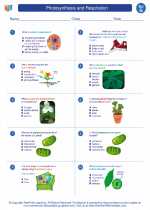 Photosynthesis and Respiration
Photosynthesis and Respiration  Worksheet/Answer key
Worksheet/Answer key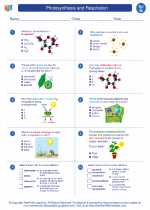 Photosynthesis and Respiration
Photosynthesis and Respiration  Worksheet/Answer key
Worksheet/Answer key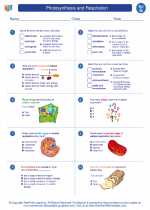 Photosynthesis and Respiration
Photosynthesis and Respiration  Vocabulary/Answer key
Vocabulary/Answer key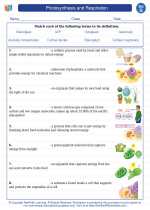 Photosynthesis and Respiration
Photosynthesis and Respiration  Vocabulary/Answer key
Vocabulary/Answer key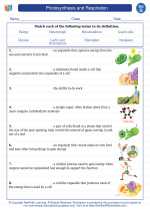 Photosynthesis and Respiration
Photosynthesis and Respiration  Vocabulary/Answer key
Vocabulary/Answer key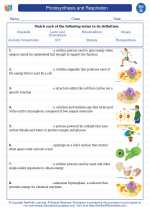 Photosynthesis and Respiration
Photosynthesis and Respiration 

 Worksheet/Answer key
Worksheet/Answer key
 Worksheet/Answer key
Worksheet/Answer key
 Vocabulary/Answer key
Vocabulary/Answer key
 Vocabulary/Answer key
Vocabulary/Answer key
 Vocabulary/Answer key
Vocabulary/Answer key

The resources above cover the following skills:
LIFE SCIENCE
Ecosystems: Interactions, Energy, and Dynamics
Examine the cycling of matter between abiotic and biotic parts of ecosystems to explain the flow of energy and the conservation of matter.
Generate a scientific explanation based on evidence for the role of photosynthesis and cellular respiration in the cycling of matter and flow of energy into and out of organisms.